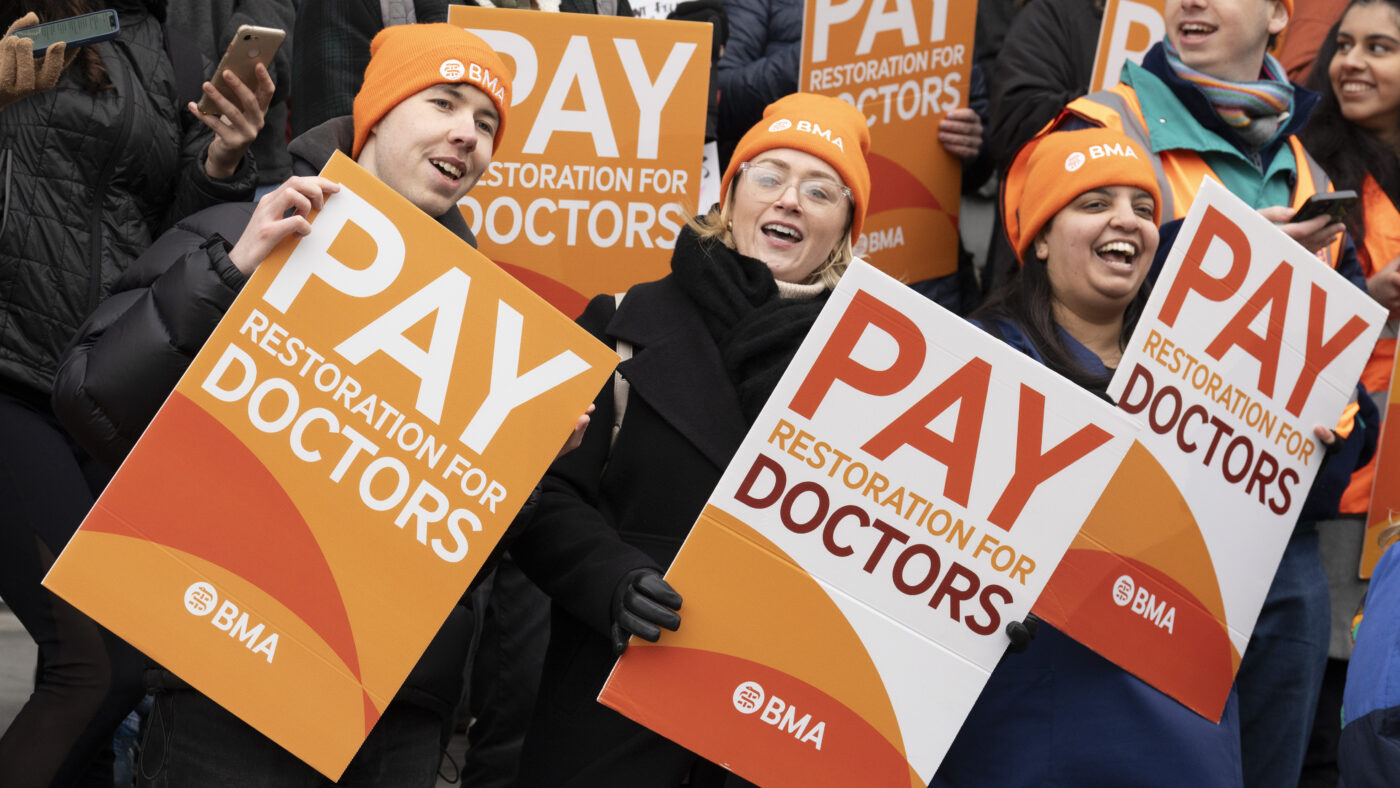Strike action has become an everyday feature in the United Kingdom leaving many people’s access to public services immensely limited. About 4m working days have been lost as a result of strikes in the past year – much to the detriment of an already weak economy. Compare this to 450,000 strike days in the average year in the 2010s and the scale of our crisis is evident.
Although striking teachers and train drivers are indeed disruptive, they don’t put people’s lives at risk. However, when junior doctors, nurses and consultants walk out, they do. Just before Christmas it was announced that there would be a three-day strike in December, followed by a six-day strike early in the New Year – the latter of which has just ended.
This particular period of the year is widely known to be when the NHS is under the most strain, usually as a result of flu, but more so this year due to Norovirus and Covid hospitalisations. As a result of the strike action and the subsequent postponement of outpatient appointments and operations, many elderly patients were left to spend Christmas cooped up in a hospital, rather than spending time with their family despite being medically fit for discharge.
During the nine months of industrial action leading to September 2023, the number of cancelled appointments hit 1.2m. This will only increase as a result of the most recent bouts of strike action, and will continue to rise if no solution is put in place to prevent monthly walkouts. The illusion that ‘our’ National Health Service is committed to both ‘compassion’ and ‘improving lives’, as per the organisation’s values, may finally be starting to break. After all, if junior doctors were as committed to patient safety as they claim, why have they chosen the worst possible time of year to walk out? Their entire strategy is predicated on the number of lives they put at risk. And the evidence is indisputable– not only have we heard innumerable accounts of patients whose cancer diagnoses have been delayed or who have been left in agony after a cancelled operation, the statistics clearly show that deaths increase following industrial action.
Last year, excess deaths were 3.9% increase above the five-year average in the two weeks during and after the strikes in March last year. That’s 833 lives lost prematurely. A clear case of putting politics above patient safety.
So what exactly do these strikers want? The British Medical Association Junior Doctors Committee were asking for a 35% pay increase, which rises to 49% when you take into account the proposed multi-year settlement for all doctors below the rank of consultant. This might seem reasonable if you believed accounts of doctors having to use food banks and struggling to heat their homes.
But when you consider that the average junior doctor in their first year on the job gets paid a little over £37,000, approximately £4,000 more than average UK worker, it starts to stretch credibility. Quite how the public, suffering themselves with higher food and energy prices, failing public services and a housing crisis, are supposed to be sympathetic to such a plea is a difficult question to answer.
Other than above average initial pay, the long-term benefits of a career in medicine are also there to be taken advantage of. Junior doctors have access to an incredibly generous pension scheme, receiving a 20% contribution from the public purse (the UK average is a little under 5%). In an attempt to keep more healthcare professionals from retiring early, the Chancellor of the Exchequer, Jeremy Hunt, removed the ‘lifetime allowance’ in his March budget.
Now, even if you still feel that junior doctors are underpaid and that other in-work benefits do not compensate, here is why the UK simply cannot afford to pay for a 35% pay increase for 75,000 NHS employees. In December last year, the Health Minister, Steve Barclay, produced a figure of how much just an 11% increase would cost – £28bn and £1,000 per household. Certainly not chump change.
An important point to remember is that currently the UK economy is stagnating. If we had high levels of growth, there could be above average wage increases, promoting rises in living standards. A pro-growth manifesto ought to be supported by public sector workers if they wish to see such large jumps to their pay packets. Currently, to counterbalance the theoretical wage increases, there would need to be yet more tax increases, a reduction in spending or adding yet more figures to national debt already nearing 100% of GDP.
With the NHS in a perpetual doom loop, a 7m patient waiting list and life-threatening emergency response times, surely now is the time that healthcare staff ought to be lobbying for a change in healthcare system. After all, public satisfaction in the NHS has dropped to under 30%, the lowest since the British Attitudes Survey began in 1983.
This represents an opportune moment for a Conservative or future Labour government to make radical change with a modicum of public support. Emulating a social-insurance system as seen in the Netherlands and Germany would likely lead to far better health outcomes than the current socialist model and potentially better pay for staff. A recent OECD report found that, taking into account the cost of living, UK nurses earn on average €16,000 less than their Dutch counterparts. If health workers are determined to continue disrupting the nation’s health, then they should do it for the benefit of all and strike for free market reform.
Click here to subscribe to our daily briefing – the best pieces from CapX and across the web.
CapX depends on the generosity of its readers. If you value what we do, please consider making a donation.


